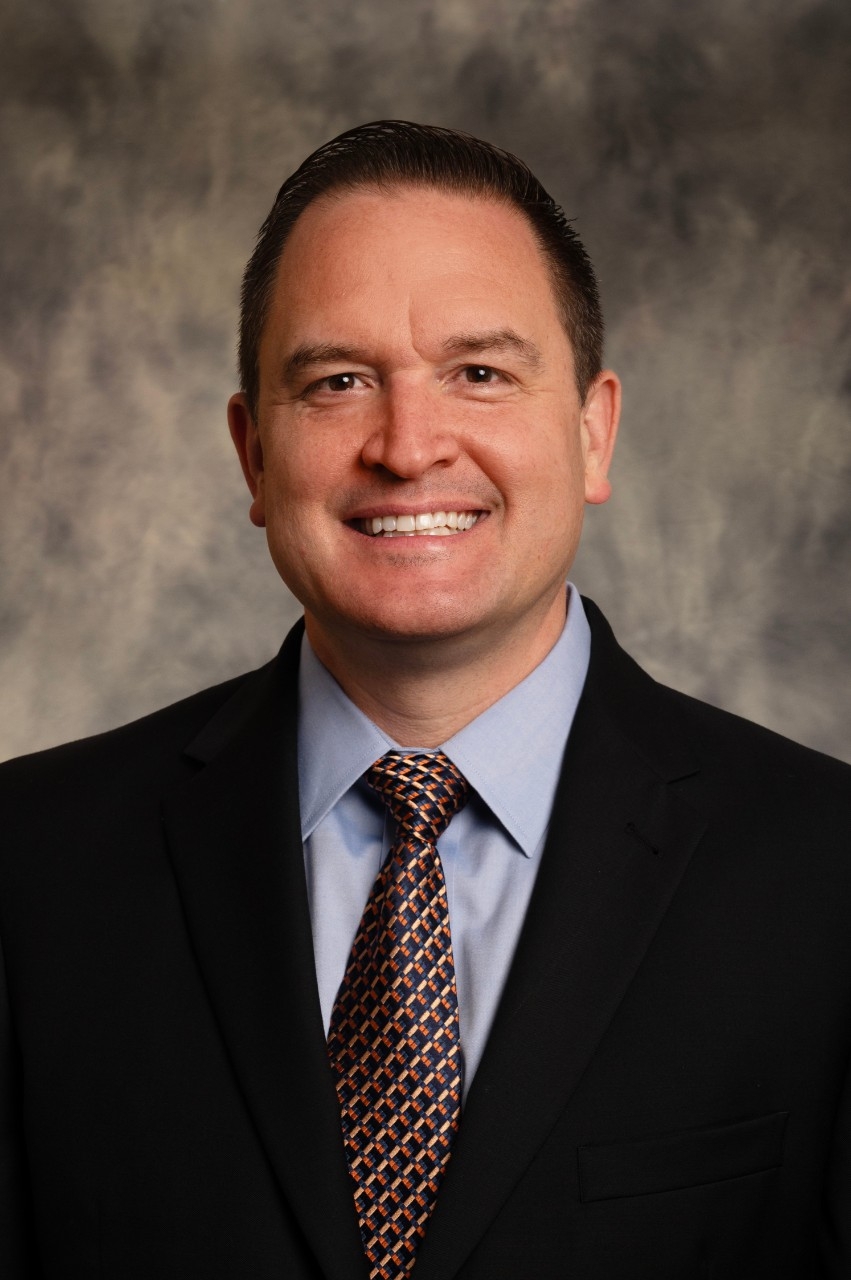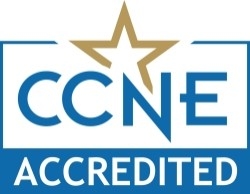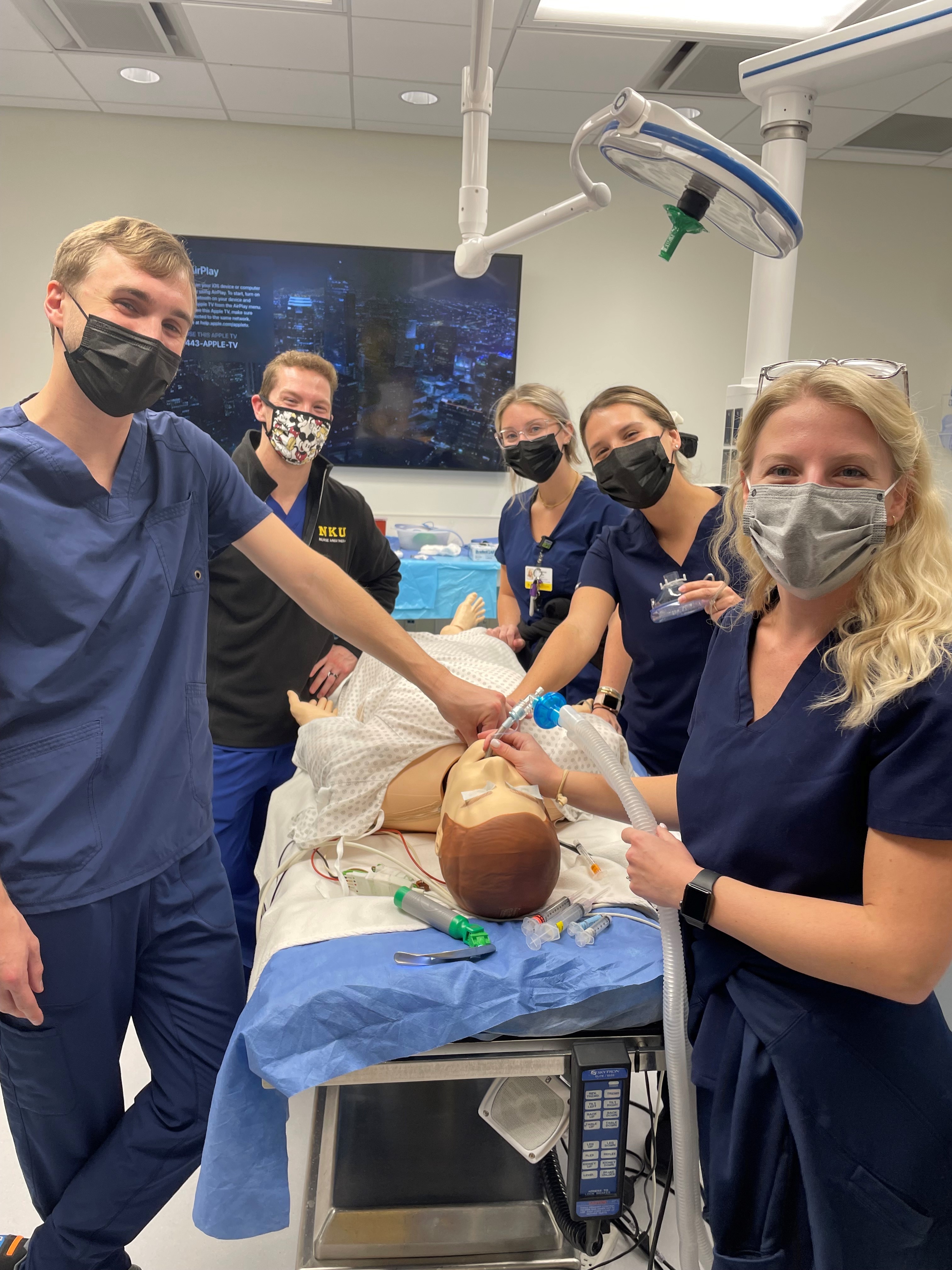
Charles D Myers III, DNP, APRN-CRNA
Nurse Anesthesia Program Director

Jennifer McLeod, DNAP, APRN-CRNA, MSNA
Associate Clinical Professor
Assistant Program Director/Nurse Anesthesia Simulation Coordinator

Courtney Hamilton, DNP, MSN, RN
Associate Clinical Professor
Didactic Faculty/DNP Project Manager

Debra Barber, DNP, APRN-CRNA
Assistant Clinical Professor
Didactic Faculty

Judy Tenhundfeld, DNAP, APRN-CRNA, MSN
Clinical Professor/Didactic Faculty

Billy Sanders, DNP, APRN-CRNA, MSN
Didactic Faculty

Evan Angus, DNP, APRN-CRNA
Didactic Faculty
The CRNA credential dates to 1956 and nurse anesthetists have been delivering safe anesthesia care for more than 150 years. The first documented administration of anesthesia by a nurse was in the Battle of Bull Run in the Civil War by Catherine T. Lawrence.
Today, CRNAs administer approximately 50 million anesthetics each year in the United States
CRNAs are the primary anesthesia provider in rural America as well as in the United States military. CRNAs provide anesthesia services including obstetrical, pain management, surgical, trauma, outpatient in every practice setting in collaboration with surgeons, dentists, podiatrists, and other healthcare providers.
SOURCE: AANA Certified Registered Nurse Anesthetists Fact Sheet.
More information about a career in nurse anesthesia is available from the American Association of Nurse Anesthetists (AANA).
**CCRN Certification Admission Requirement: If you are lacking the CCRN requirement, please begin the application process to the NAP now, the CCRN certification documentation may be added at a later date.
*Critical care is defined by the Council on Accreditation of Nurse Anesthesia Educational Programs (COA) as: “Critical care experience must be obtained in a critical care area within the United States, its territories or a US military hospital outside of the United States. During this experience, the registered professional nurse has developed critical decision making and psychomotor skills, competency in patient assessment, and the ability to use and interpret advanced monitoring techniques. A critical care area is defined as one where, on a routine basis, the registered professional nurse manages one or more of the following: invasive hemodynamic monitors (e.g., pulmonary artery, central venous pressure, and arterial catheters), cardiac assist devices, mechanical ventilation, and vasoactive infusions. Examples of critical care units may include but are not limited to: surgical intensive care, cardiothoracic intensive care, coronary intensive care, medical intensive care, pediatric intensive care…..” (Standards for Accreditation of Nurse Anesthesia Programs, Practice Doctorate, 2016)
Program Technical Standards
Technical standards define physical and other attributes required to be successful in the nurse anesthesia profession. Applicants must review the program technical standards (pdf) and acknowledge having reviewed them during the application process. Upon admission, applicants will be asked to verify they can meet the standards or request consideration in meeting the standards through the NKU Student Accessibility Services office.
Minimum requirements for students to the MS-DNP NAP
A maximum of 9 semester credit hours of doctoral-level work may be transferred from another institution to be applied toward the DNP degree requirements. The institution must be approved for graduate credit by the Graduate School of Northern Kentucky University.
All courses to be transferred must be letter-graded with a grade of B or better and must be demonstrated to relate directly to the degree being sought. The transferred grades will not be computed in the student’s grade-point average.
Students must have taken the courses prior to admission of the DNP program. Transfer courses must be at the doctoral level equivalent of what is being offered in the DNP Program. Courses can be no more than eight years old by the time the student graduates from the DNP program. Students wishing to complete and transfer in courses while currently enrolled in the DNP Program must first obtain approval.
The following courses will be eligible for consideration for transfer into DNP program upon receiving the course description and syllabus:
Additional courses may be considered for transfer only through the approval of the NAP program director.
Click for our current Attrition, NCE Pass Rates, & Employment Rates
The BSN-DNP program is 3 years (36 months) or 9 semesters in length requiring 106 credit hours.
Our Post-Master's CRNA is 37 semester credits or 6 semesters.
The program will start in May, at the beginning of the summer semester
These programs are designed to grant a Doctor of Nursing Practice (DNP) with a specialization in anesthesia. Graduates are qualified to take the National Board for Certification and Recertification of Nurse Anesthetists (NBCRNA) National Certification Exam (NCE) and practice as a APRN in the role of the CRNA.
We will admit up to 20 students each year to the BSN-DNP track. The Post-Master's CRNA Track will accept 5 students each year.
Click here to view a list of tuition and fees for BSN-DNP Program
Click here to view a list of tuition and fees for the Post-Masters to DNP Program
**Students in the following counties in OH will be charged the KY Resident Rate: Adams, Brown, Butler, Clermont, Clinton, Fayette, Hamilton, Highland, or Warren.
**Students in the following counties in IN will be charged the KY Resident Rate: Dearborn, Franklin, Jefferson, Ohio, Ripley, & Switzerland.
Admission requirements are listed under Admissions Process above.
A baccalaureate degree in nursing from an accredited program is required for all applicants to the BSN to DNP Program. The institution awarding the baccalaureate must be accredited by the ACEN, NLNAC, or CCNE.
One year minimum full-time of critical care experience as RN within the past 2 years with employer verification (Employment Verification Form).
Critical care is defined by the Council on Accreditation of Nurse Anesthesia Educational Programs (COA) as: “Critical care experience must be obtained in a critical care area within the United States, its territories or a US military hospital outside of the United States. During this experience, the registered professional nurse has developed critical decision making and psychomotor skills, competency in patient assessment, and the ability to use and interpret advanced monitoring techniques. A critical care area is defined as one where, on a routine basis, the registered professional nurse manages one or more of the following: invasive hemodynamic monitors (e.g., pulmonary artery, central venous pressure, and arterial catheters), cardiac assist devices, mechanical ventilation, and vasoactive infusions. Examples of critical care units may include but are not limited to: surgical intensive care, cardiothoracic intensive care, coronary intensive care, medical intensive care, pediatric intensive care…..” (Standards for Accreditation of Nurse Anesthesia Programs, Practice Doctorate, 2015)
Areas not considered as critical care include, but not limited to: Neonatal ICU; PACU; Emergency Department; Cardiac Cath Lab; Operating Room.
Applicants should obtain the highest level of acuity experience as possible.
All applicants must possess a valid, unencumbered RN license from at least one of the 50 United States. Applicants are required to submit, at the time of application, a copy of their valid, unencumbered RN license from the state in which they currently practice.
Kentucky and Ohio Registered Nursing licenses are not required for the application process, however both Kentucky and Ohio RN licenses are required before entry into the program. Licenses in both Ohio and Kentucky are required prior to starting the program and must be maintained throughout the program.
Most states are no longer issuing paper copies of licenses, we will accept a printout from your state's Board of Nursing website with the license details (name, license type, issue date, expiration date, and disciplinary action).
The GRE is not required.
For information concerning admissions and the application process, please visit the Office of Graduate Education
Applicants will be notified via email if they are selected for an interview in mid to late September. Interviews will occur in October. Not all applicants will be interviewed. Due to the competitive nature of the admission process, meeting minimum standards does not guarantee admission. All applicants will be screened and the most qualified will be invited for interview. Strong applicants will be reviewed and considered for early interview.
Yes, financial assistance is available.
Yes, the CCRN is required for the BSN - DNP application.
You do not need a PALS certification to apply but all students accepted into the program must have a current PALS certification as well as BLS and ACLS (American Heart Association) before starting the program and remain current throughout the program.
Due to heavy course and clinical load, students are not encouraged to work. Students can expect to spend on average 64 hours each week committed to anesthesia studies. Starting in the fourth semester, the student will enter the anesthesia practicum courses and will not follow the university calendar for clinical practicum courses. Students in the practicum courses are required to work off shifts and take in-house calls, creating a further demand on their time commitment. Didactic courses do follow the university calendar.
Students may choose to seek outside employment only if they are maintaining satisfactory academic progress.
Yes, a non-refundable matriculation fee of $1,000 is required if accepted into the program. The matriculation fee will be applied to student’s account on admission. If the applicant does not enroll in program, the matriculation fee is forfeited.
Request to transfer from other nurse anesthesia programs will be considered by the Program Director on a case by case basis. To be considered for transfer:
Yes, as of January 2020 NKU will offer an advanced standing in the DNP Program for master's prepared CRNAs.
You must be a Registered Nurse and meet all admission criteria to apply.
Please review the admission criteria, which includes information on minimum standards for both overall GPA (3.0) and science GPA (3.0).
Applicants are required to shadow with either a CRNA or an anesthesiologist to gain an understanding of the nurse anesthesia role through both observation and discussion. Shadowing a CRNA is preferred to learn the role. Applicants are responsible for arranging their own shadow experience and ensuring that the anesthesia provider completes the Shadowing Form. The Shadowing Form must be submitted with your application.
No, the program is designed as a full-time study only.
Only the DNP core courses are online. Anesthesia specialty courses are on-site at NKU. Select Anesthesia specialty courses may be offered as hybrid.
Students rotate to various clinical sites in the Greater Cincinnati area with the opportunity for clinical placement in Lexington and/or Louisville, Kentucky. Rotation is determined by clinical case requirements.
Clinical sites include: St. Elizabeth’s Medical Center, Edgewood, Florence, and Fort Thomas; Bethesda North; Good Samaritan; Mercy West Hospital; Mercy Jewish, The Christ Hospital; and Cincinnati Children’s Hospital Medical Center in the greater Cincinnati area. As well as, Saint Joseph Hospital in Lexington, Kentucky and Norton Audubon and Jewish Hospital in Louisville, Kentucky.
Responsibilities in Clinical Area: Students and faculty must adhere to all NKU, NAP, CHHS, and clinical affiliate policies and procedures while participating in the program on the clinical site. This includes adhering to the Ethical and Religious Directives for Catholic Health Care Services while participating in the program at all St. Elizabeth’s Medical Center sites (Edgewood, Fort Thomas, Florence as well as the SurgiCenter sites Edgewood and Crestview Hills) and other Catholic Health Care Service Hospitals.
This is a completed Graduate Reference form. Once complete, it should be sent to the Office of Graduate Education. Suggested recommenders include: Nurse Manager (the person responsible for your performance evaluation); an individual in a leadership position who can speak to your clinical abilities (i.e. an APRN, CNS, nurse educator, medical director); or an academic faculty member who has personally taught the applicant recently. Recommendations from friends, relatives, or peer co-workers are not acceptable.
What is a Goal Statement: Please refer to the Tips for Writing Graduate School Admission Essays/Personal Statements. Your Goal Statement should be less than 500 words and upon completion should be submitted directly to the Office of Graduate Education. If you are reapplying following an unsuccessful application, it is recommended that you revise the goal statement to highlight the changes you have made to become a better applicant.
Through evidence based practice, the graduate must synthesize knowledge, skills and competencies in patient safety, perianesthesia care, critical thinking, communication, leadership, and professional role as demonstrated by the ability to:
The NKU Nurse Anesthesia Program is accredited by the Council on Accreditation of Nurse Anesthesia Educational Programs (COA), 10275 W. Higgins Rd. Suite 906, Rosemont, IL 60018-5603; Phone: 224-275-9130. The program's next review by the COA is scheduled for Fall, 2032.

The Doctor of Nursing Practice programs at Northern Kentucky University are accredited by the Commission on Collegiate Nursing Education.
The college reserves the right to change the program of study as needed to fulfill state approval, regional and national accreditation, other certification organizations, and/or college requirements.

Northern Kentucky University is named one of the world's top-tier learning environments for practicing real-life health care situations. NKU's Center for Simulation Education earned teaching and education accreditation from the Society for Simulation in Healthcare and the Council for Accreditation of Healthcare Simulation Programs. NKU is the Commonwealth's only university to receive full accreditation, a feat accomplished by 183 other simulation centers internationally.
Nurse Anesthesia Information Sessions for Summer 2026:
- May 20, 2026 at 4:00pm in Founders Hall 466 (in person only)
- June 10, 2026 at 4:00pm (via Zoom)
- July 15, 2026 at 4:00pm in Founders Hall (in person only)
Applications will only be accepted from June 1, 2026 through August 30, 2026.
Follow us on social media!